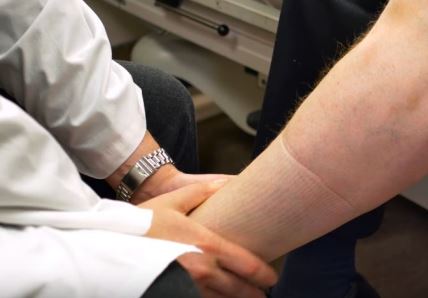Newsroom
New blood thinner better at preventing recurrent blood clots than aspirin
March 18, 2017

An international research team with prominent Canadian leadership has found that the blood thinner rivaroxaban is as safe as aspirin, and more effective at preventing recurrence of life-threatening blood clots in the legs and lungs, according to a study published in the New England Journal of Medicine.
At least one out of 1,000 Canadians will experience one of these blood clots every year, a condition called venous thromboembolism. The clots can be deadly if they travel to the lungs (pulmonary embolism), and are the third most common cardiovascular cause of death after heart attack and stroke.
Venous thromboembolism is a chronic disease, with risks of additional blood clots over a patient’s lifetime. However, many physicians and patients are deciding against long-term treatment with blood thinners because of concern about the risk of bleeding. Some are choosing aspirin instead because they consider it to be safer.
The large international study of 3,396 patients with venous thromboembolism in 31 countries shows, however, that rivaroxaban is more effective than aspirin.
“Not only that, but in testing two doses of rivaroxaban, we found that we have the option of lowering the daily dose for extended treatment,” said Dr. Jeffrey Weitz, principal investigator of the study and professor of medicine and biochemistry and biomedical sciences at the Michael G. DeGroote School of Medicine at McMaster University. “This will ease the long-term concerns of both patients and their doctors.”
During the study from March 2014 to March 2016, patients received either a daily 20mg dose of rivaroxaban, a 10mg dose of rivaroxaban, or a 100 mg dose of aspirin. They took these medications for up to 12 months after they had received treatment for their initial clot.
The researchers found that patients taking aspirin had the highest rate of recurrent blood clots, at 4.4 percent. The rates of recurrent clots for patients taking 20mg and 10mg of rivaroxaban were significantly lower, at 1.5 and 1.2 percent respectively.
When they looked at bleeding side-effects, there were no statistically significant differences between the treatments. The rates of major bleeding were 0.3 percent in the group taking aspirin, and 0.5 percent and a 0.4 percent in the groups taking 20 mg and 10mg of rivaroxaban, respectively.
Dr. Philip Wells, head of the Department of Medicine and senior scientist at The Ottawa Hospital and the University of Ottawa and an author of the study, will present the research at the American College of Cardiology's 66th Annual Scientific Session today.
“We know from previous studies that only about 40 percent of venous thromboembolism patients are actually on long-term blood thinners,” said Wells. “We hope that this study, which shows the blood thinner rivaroxaban is as safe as aspirin but much more effective at preventing future clots, will convince patients and their physicians to continue life-long medication that can prevent potentially dangerous blood clots.”
Rivaroxaban is a prescription drug available in Canada for about $100 a month, and most private insurance plans will cover the cost. Aspirin costs pennies a day and is available over the counter.
The study was funded by Bayer AG.
Full reference: Rivaroxaban or Aspirin for Extended Treatment of Venous Thromboembolism. Jeffrey I. Weitz, Anthonie W.A. Lensing, Martin Prins, Rupert Bauersachs, Jan Beyer-Westendorf, Henri Bounameaux, Timothy A. Brighton, Alexander T. Cohen, Bruce L. Davidson, Hervé Decousus, Maria Cecilia S. Freitas, Gerlind Holberg, Ajay Kakkar, Lloyd Haskell, Bonno van Bellen, Akos F. Pap, Scott D. Berkowitz, Peter Verhamme, Philip S. Wells, Paolo Prandoni, on behalf of the EINSTEIN CHOICE Investigators. The New England Journal of Medicine. March 18, 2017
About McMaster University: McMaster University, one of four Canadian universities listed among the Top 100 universities in the world, is renowned for its innovation in both learning and discovery. It has a student population of 30,000, and more than 170,000 alumni in 137 countries.
About The Ottawa Hospital: Inspired by research. Driven by compassion: The Ottawa Hospital is one of Canada’s largest learning and research hospitals with over 1,100 beds, approximately 12,000 staff and an annual budget of over $1.2 billion. Our focus on research and learning helps us develop new and innovative ways to treat patients and improve care. As a multi-campus hospital, affiliated with the University of Ottawa, we deliver specialized care to the Eastern Ontario region, but our techniques and research discoveries are adopted around the world. We engage the community at all levels to support our vision for better patient care. See www.ohri.ca for more information about research at The Ottawa Hospital.
About the University of Ottawa —A crossroads of cultures and ideas: The University of Ottawa is home to over 50,000 students, faculty and staff, who live, work and study in both French and English. Our campus is a crossroads of cultures and ideas, where bold minds come together to inspire game-changing ideas. We are one of Canada’s top 10 research universities—our professors and researchers explore new approaches to today’s challenges. One of a handful of Canadian universities ranked among the top 200 in the world, we attract exceptional thinkers and welcome diverse perspectives from across the globe. www.uottawa.ca
Media Contacts:
Veronica McGuire, Media Relations Co-ordinator, Faculty of Health Sciences, McMaster University; vmguir@mcmaster.ca; Office: 905-525-9140 x 22169; Cell: 289-776-6952
Amelia Buchanan, Senior Communication Specialist, Ottawa Hospital Research Institute; ambuchanan@ohri.ca; Office: 613-798-5555 x 73687; Cell: 613-297-8315
